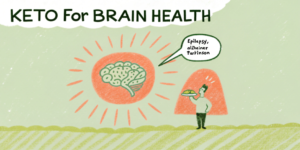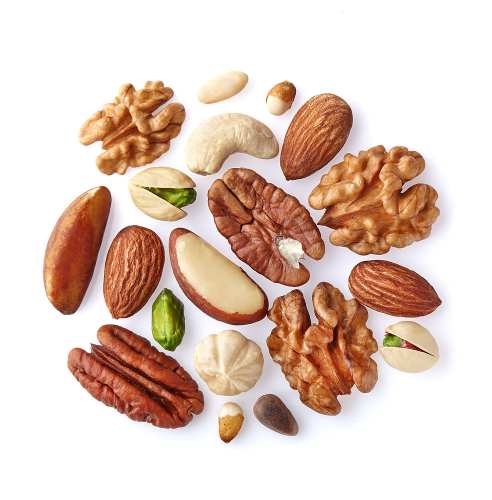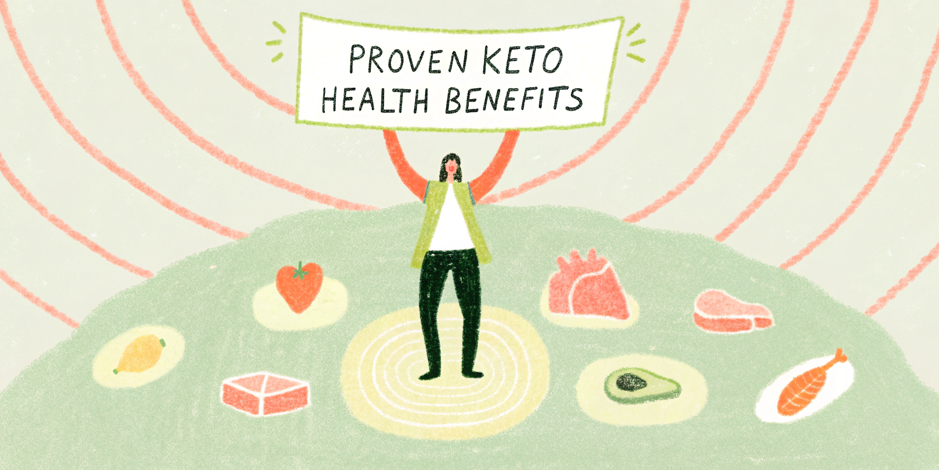The ketogenic diet (keto) and other low-carb diets have been studied extensively for their health benefits, ranging from weight loss and metabolic health to brain function and cardiovascular improvements. While these diets were initially controversial due to their high fat content, research now shows they offer a variety of scientifically proven health advantages.
In this expanded guide, we will explore ten evidence-based benefits of low-carb and ketogenic diets and how they may improve overall health and well-being.

1. Low-Carb Diets Reduce Appetite and Cravings
One of the main reasons people fail on traditional diets is hunger and cravings. However, studies have found that low-carb and ketogenic diets help suppress appetite naturally.
- Protein and Fat Promote Satiety: A diet high in healthy fats and protein leads to a natural reduction in hunger, making it easier to sustain a calorie deficit without feeling deprived.
- Reduced Ghrelin Levels: Ghrelin, also known as the hunger hormone, is significantly reduced in people on low-carb diets, leading to better appetite control.
Lower Blood Sugar Spikes: By cutting carbs, you avoid blood sugar fluctuations, reducing cravings and energy crashes (NCBI).

2. Low-Carb Diets Promote Faster and More Effective Weight Loss
Cutting carbohydrates is one of the simplest and most effective ways to lose weight.
- Initial Rapid Weight Loss: Low-carb diets lead to rapid water weight loss due to lower insulin levels.
- Higher Fat Oxidation: By reducing carb intake, the body becomes more efficient at burning stored fat.
Long-Term Benefits: Studies show that low-carb diets outperform low-fat diets in weight

- loss over the first 6 months, though long-term weight loss may be similar (Nature).
3. Low-Carb Diets Target Harmful Abdominal Fat
Not all body fat is created equal. Visceral fat, which accumulates in the abdominal cavity and around organs, is linked to metabolic diseases like type 2 diabetes and heart disease.
- Low-carb diets effectively reduce abdominal fat faster than other diets.
- Improved Insulin Sensitivity: Reducing visceral fat leads to better insulin sensitivity, reducing the risk of diabetes.
- Lower Inflammation: Abdominal fat contributes to chronic inflammation, and reducing it leads to better overall health (BMC Medicine).
4. Triglyceride Levels Drop Significantly
Triglycerides are fat molecules in the blood that, when elevated, increase the risk of heart disease.
- Carbs, especially sugar, raise triglycerides, leading to a higher risk of cardiovascular disease.
- Low-carb diets dramatically reduce triglycerides, improving heart health.
- Low-fat diets, on the other hand, often increase triglyceride levels (BMC Medicine).
5. Increased Levels of ‘Good’ HDL Cholesterol
HDL cholesterol (high-density lipoprotein) is known as “good” cholesterol because it helps remove bad cholesterol from the bloodstream.
- Low-carb diets significantly raise HDL levels.
- Eating healthy fats (avocados, olive oil, fatty fish) further enhances HDL levels.
- Higher HDL is associated with a lower risk of heart disease (Stanford Medicine).
6. Lower Blood Sugar and Insulin Levels
For individuals with type 2 diabetes or insulin resistance, keto offers major benefits:
- Significant reductions in blood sugar levels.
- Lower insulin requirements in people with diabetes.
- Some diabetics can reduce or eliminate their glucose-lowering medication on keto.
- More stable energy levels without blood sugar crashes (Nature).

7. Lower Blood Pressure and Reduced Risk of Heart Disease
High blood pressure (hypertension) is a major risk factor for strokes, heart attacks, and kidney failure. Low-carb diets effectively lower blood pressure and improve cardiovascular health.
- Reduction in systolic and diastolic blood pressure.
- Better blood vessel function and reduced inflammation.
- May decrease the risk of hypertension-related diseases (BMC Medicine).
8. Low-Carb Diets Reverse Metabolic Syndrome
Metabolic syndrome is a collection of risk factors that increase the risk of diabetes and heart disease.
- Keto corrects all five key markers of metabolic syndrome:
- Abdominal obesity
- Elevated blood pressure
- Elevated fasting blood sugar
- High triglycerides
- Low HDL cholesterol (Wikipedia).
9. Improvements in LDL Cholesterol Profiles
While “bad” LDL cholesterol is linked to heart disease, the size of LDL particles matters more.
- Keto increases LDL particle size, making them less likely to contribute to plaque buildup.
- Lowers total LDL particle count, reducing cardiovascular risk (Stanford Medicine).
10. Therapeutic Benefits for Brain Disorders
Low-carb and keto diets have significant therapeutic potential for brain conditions.
- Proven effectiveness in epilepsy, reducing seizures in children.
- Potential benefits for Alzheimer’s and Parkinson’s disease.
Enhanced brain function and neuroprotection (Stanford Medicine).

Conclusion: Should You Try a Low-Carb Diet?
The scientific evidence supporting low-carb and ketogenic diets is extensive. Weight loss, improved metabolic function, brain health, and cardiovascular benefits make these diets powerful tools for improving overall health.
✔ Reduces hunger and cravings
✔ Promotes sustainable fat loss
✔ Improves heart health and blood sugar control
✔ Supports cognitive function and neuroprotection
✔ Lowers inflammation and metabolic disease risk
As always, consult a healthcare professional before making major dietary changes.

 Animal-Based Foods
Animal-Based Foods 


 Fruits & Vegetables
Fruits & Vegetables 


 Nuts, Seeds & Grains
Nuts, Seeds & Grains 


 Beverages
Beverages 

 Oils, Sauces & Condiments
Oils, Sauces & Condiments 



 Packaged & Processed Foods
Packaged & Processed Foods 




